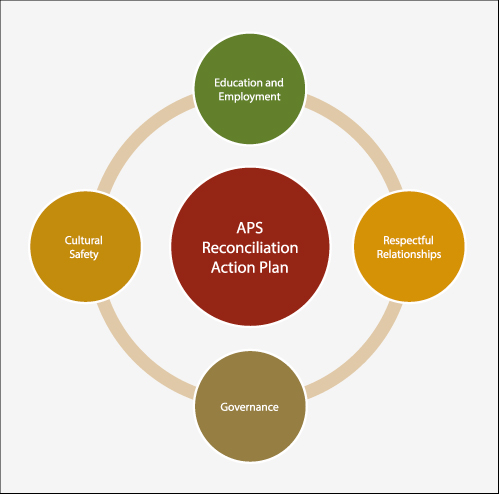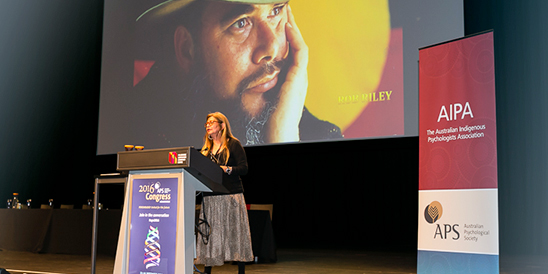Artwork by Anyupa Butcher © 2012
"Reconciliation is a two way process, it gives us all the chance to learn, value and respect new and different forms of knowledge and interventions. It enables us to learn about how best to work in ways that will assist Aboriginal and Torres Strait Islander people to heal, to feel values and have self-esteem as a distinct cultural group, and ultimately have the best mental health and live to be the best potential in their lives. It also provides an opportunity to enhance our profession through the wisdom of Aboriginal and Torres Strait Islander cultures and experiences."
Professor Pat Dudgeon
As the leading organisation for psychologists in Australia, the APS represents more than 27,000 members. We recognise the pressing need for reconciliation and are committed to taking action.
We have identified a number of key areas for action. Ongoing action is needed from us and our members to continue to develop in these key areas.

We hope to translate our commitment to reconciliation into better outcomes for Aboriginal and Torres Strait Islander people and communities.
Cultural Awareness, Responsiveness and Safety
Cultural awareness and responsiveness training facilitates understanding, respectful relationships and collaboration.
We have been working to ensure that our members have an understanding of the Indigenous Australian culture, history and people, and facilitating the cultural awareness and responsiveness of psychologists to work with Aboriginal and Torres Strait Islander communities.
Thus far, about 600 psychologists have undertaken AIPA’s highly successful Cultural Competence Training for the mental health workforce, auspiced by the APS and rolled out throughout the country for Access To Allied Psychological Services (ATAPS) providers.
Further to this, all APS staff members and the APS Board participated in cultural awareness and responsiveness workshops in 2016.
Moving forward, the Australian Indigenous Psychology Education Project (AIPEP) remains a priority for us. One of the challenges for the future will be working towards embedding relevant cultural awareness and curriculum content across 40 higher education providers.
Under our first RAP we updated our ethical guidelines to provide further support to APS members and psychologists on culturally responsive work with Aboriginal and Torres Strait Islander people.
Indigenous Education and Employment
Increasing the number of Aboriginal and Torres Strait Islander psychologists and facilitating the ongoing training and support of Indigenous people in psychology is of crucial importance.
The Australian Indigenous Psychology Education Project (AIPEP) provided leadership and direction for actions in the priority area of Indigenous Education and Employment.
Although the number of psychologists who identify as Aboriginal and/or Torres Strait Islander has increased significantly since 2006, these numbers remain below population parity. AIPEP has developed a framework, strategies and recommendations to increase the recruitment, retention and graduation of Aboriginal and Torres Strait Islander students in psychology degrees.
Enriching the discipline of psychology by incorporating Aboriginal and Torres Strait Islander knowledges and perspectives into the curriculumis is another significant objective.
AIPEP has developed resources (including a curriculum framework) to embed Indigenous knowledges in the psychology curriculum to ensure a culturally responsive and safe psychology workforce.
Respectful Relationships
The APS Indigenous Psychology Advisory Group (IPAG) was set up as the successor to the RAP Working Group. IPAG advises the APS Board on all Indigenous-related matters.
Another objective in building respectful relationships is developing and embedding cultural protocols for APS meetings and events. These protocols assist both Member Groups and individual members to understand, develop and use local cultural protocols. The APS Member Groups continue to make extensive use of two important resources that help to facilitate their engagement towards respectful relationships:
A major milestone has been our formal Apology to Aboriginal and Torres Strait Islander people, acknowledging psychology’s role in contributing to the erosion of culture and making a commitment to change.
Governance
A key learning in the area of governance is the importance of good collaboration between the APS and the Australian Indigenous Psychologists Association (AIPA). This collaboration occurs across a range of key activities and initiatives, including conference programming, funded projects, reviews and external submissions.
AIPA also provided cultural awareness and responsiveness training for the APS Board and staff. This training has provided a foundation for continued commitment to culturally sensitive governance processes.

Keynote speaker, Professor Patricia Dudgeon is pictured in front of a photo of Rob Riley at the 2016 APS Congress.